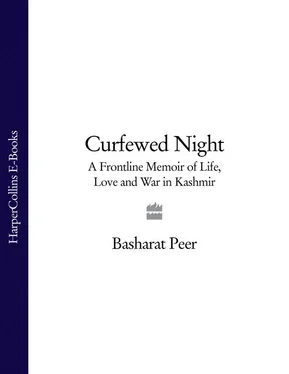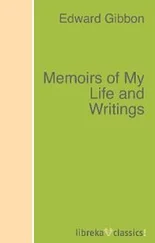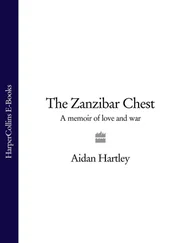Farhad had survived the impossible task, and the canal was nearing completion. King Khusro was worried by the thought of keeping his promise and letting his wife marry another man, a commoner. His advisers had a plan: An old woman should be sent to the mountains to tell Farhad that Shirin was dead. It would break Farhad’s resolve and make him leave the canal unfinished. Farhad was toiling away when an old woman arrived, crying, choking on her words. “Mother, why do you cry?” he asked. “I cry for a dead beauty,” she said. “And I cry for you, brave man!” “For me?” a surprised Farhad asked. “You have cut the mountains, brave man! But your beloved, the beautiful Shirin, is dead!” Farhad struck himself with his spade and fell, his last cry resounding through the mountains: Shirin!
My family ate dinner together in our kitchen-cum-drawing room, sitting around a long yellow sheet laid out on the floor, verses of Urdu and Farsi poetry extolling the beauty of hospitality painted in black along its borders. Dinner often began with Grandfather leaning against a cushion in the center of the room and turning to my mother: “Hama, looks like your mother will starve us today.” Grandmother would stop puffing her hookah and say, “I was thinking of evening prayers. But anyway, let me feed you first.” And she would amble toward her wooden seat near the earthen hearth above which our tin-plated copper plates and bowls sat on various shelves. Mother would leave aside her knitting kit or the papers of her students and briskly move to arrange the plates and bowls near Grandmother’s throne. I would fill a jar with water and get the bowl for washing hands. “Call the girls,” mother would say, and I would go upstairs to announce to my aunts that dinner was ready.
Two of my younger aunts—Tasleema and Rubeena—lived with us; the others were married but visited often with their kids and husbands. Tasleema, the geek, was always poring over thick chemistry and zoology texts or preparing some speech for her college debating society and practicing her hand gestures in front of a mirror. Rubeena didn’t care much about textbooks but had great interest in women’s magazines, detective fiction, and Bollywood songs, which always played at a low volume on her transistor, strategically placed by her side, to be switched off quickly if she heard someone climbing the stairs.
We would form a circle with Grandfather at its center and eat. Almost every time we cooked meat or chicken, he would cut a portion of his share and place it on my plate and tell Tasleema to bring a glass of milk for Akram, who would be visibly tired after a long day of work at the orchards or the fields.
In the morning, we would gather around a samovar of pink salty milk tea, and then Grandfather and Mother would leave to teach, and my aunts, my brother, and I would leave for our colleges and schools. My school, a crumbling wooden building in the neighboring small town of Mattan, was named Lyceum after Plato’s academy. Saturdays meant quizzes, debates, and essay competitions. Once I got the first prize—three carbon pencils and two notebooks wrapped in pink paper—for writing about the hazards of a nuclear war. Hiroshima and Nagasaki were just names to memorize for a quiz, as were the strange names of those bombs—Little Boy and Fat Man. I concerned myself with learning to ride a bicycle, playing cricket for my school team, grabbing my share of fireen (a sweet pudding of almonds, raisins, milk, and semolina topped by poppy seeds and served during a break in the nightlong prayers at our mosque before Eid), or trying to stretch the predawn eating limit during Ramadan.
We woke up long before dawn during Ramadan. Grandmother and Mother heated the food and the traditional salty tea. Grandfather read the Quran; my younger brother, Wajahat, and I yawned till we ate. We ate quickly because you had to stop eating after you heard the call for prayers. Often we would take a few more bites after the azaan , the call for prayer, peeping out of the kitchen window and turning back to say, “You still can’t see the hair on your forearm without artificial light.” The expression dated back to the times when there were no watches. People determined daybreak by looking at their arms. If they could see the hair on their forearms, they decided it was dawn and stopped eating. Despite Japanese electronic watches, the tradition came in handy when you were trying to gulp down some more tea or eat another morsel. Grandfather, who ate little, would remind us of the purpose of fasting: “To understand what hunger means and to learn to be kind to the poor.”
Toward the end of Ramadan, the talk about the meanings of fasting would lessen, and my brother and I would grow excited about the festival of Eid. On the twenty-ninth evening, everyone searched the sky with great hope for the silver sliver of a new crescent announcing the end of fasting. But the orange sun seemed to slide behind the jagged mountain peaks with great reluctance, as if it were being imprisoned for the night. All the neighborhood children would stand in the courtyard of our house staring at the horizon as it changed from shades of red and orange to a dark blue. We looked and shouted at each other, “You saw it?” “Not yet.” Soon we would run up the stairs of our houses, continuing our search from the windows; our shouts grew louder as we moved from the first floor to the second to the third. If the crescent remained evasive, my brother and I would scuttle back to the kitchen, where Grandfather would be jumping from one radio station to the other, hoping for reports of crescent spotting.
Every morning on Eid, Mother would prepare kahwa . My brother and I followed Father and Grandfather to a clearing on the slope of the mountain overlooking the village shaded by walnut trees, which served as Eidgah, the ceremonial village ground for Eid prayers twice a year, and marked as such by an arched pulpit in a western corner from where the imam led the prayers and read his sermon. We met relatives and friends on the way. Everybody dressed in new clothes and smiled broadly. We sat in long rows on jute mats brought from our mosque. The prayers lasted only a few minutes, but a very long sermon followed. The preacher gave the same sermon every year, and my friends and I would look for ways of slipping away. Our parents, relatives, and neighbors gave us Eidyaneh , or pocket money, to spend on toys and crackers.
Young men and adolescents from our village would hire a bus and go to the Heaven cinema in the neighboring town, Anantnag, and watch the latest Bollywood film. I wasn’t allowed to join them, but after they returned, I was riveted by their detailed retelling of the movie. I would populate their stories with the faces from movie posters. The canvases, covered in bright reds, yellows, greens, and browns, hung from electric poles by the roadside or were ferried around the village once a week on a tonga , a horse carriage, while an announcer standing beside the tonga wallah , the carriage driver, dramatically proclaimed the release of a new movie from a megaphone. Every poster was a collage of hypertheatrical expressions: an angry hero in a green shirt and blue trousers, with a pistol in hand and a rivulet of blood dripping from his face; a woman in a red sari tied to a pole with thick ropes, her locks falling over her agonized face; the luxuriously mustached villain in a golden suit, smoking a pipe or smiling a treacherous smile.
I would spend most evenings doing my homework. One evening I was distracted by the strains of a Bollywood song coming from our neighbor’s house. I hunched over my notebooks, but the music made my body restless, eager to break away. I tried to focus on the sums, but the answers kept going wrong. Grandfather slapped me and left the room. Every schoolboy got a few canings and slaps for not doing the homework properly. Grandfather tried to ensure that no music was played in our house; anything that he considered un-Islamic was forbidden. Strict interpretations of Islam do consider music—except at a wedding—un-Islamic. Mohammed Iqbal, the great Urdu poet and philosopher of Kashmiri ancestry who had studied philosophy in Munich, was influenced by Nietzsche, and propagated the ideal of superman-like Muslim youth, was welcome. Bollywood actresses dancing around trees, singing songs of love and longing, could lead to bad grades and worse: a weakened faith. Once I did not come first in class and hid under my father’s bed to escape a beating. “Spare the rod and spoil the child,” Grandfather loved to say. He spent about two hours every evening giving me lessons, checking my notebooks, smiling if I lived up to his expectations, scolding me if I failed. He wanted me to be like his best student: my father.
Читать дальше












